Jacques Rancière
Rok narození: 1940
Profese: filosof
Země: Francie
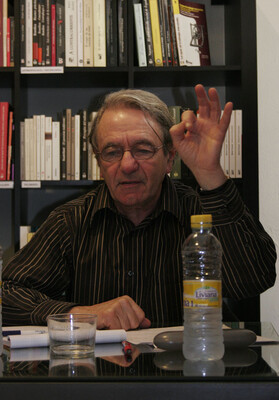
Jacques Rancière (* 10. června 1940, Alžír) je francouzský marxistický filozof narozený v Alžírsku. Byl žákem Louise Althussera, dokonce i spoluautorem jeho známé knihy Lire le Capital, roku 1968 ho však kvůli sporu o interpretaci Pařížského května zavrhl. Je emeritním profesorem na Univerzitě Paříž VIII v Saint-Denis. K jeho velkým tématům patří vztah politiky a filozofie, Marxův koncept proletariátu, koncept rovnosti, zajímají ho ovšem i otázky pedagogiky či estetiky, zejména filmové. (zdroj wikipedie.org)
Publikace autora
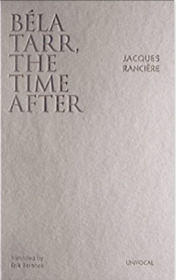
Béla Tarr, the time after
Jacques Rancière
anglicky / 81 stran
From Almanac of Fall (1984) to The Turin Horse (2011), renowned Hungarian filmmaker Béla Tarr has followed the collapse of the communist promise. The “time after” is not the uniform and morose time of those who no longer believe in anything. It is the time when we are less interested in histories and their successes or failures than we are in the delicate fabric of time from which they are carved. It is the time of pure material events against which belief will be measured for as long as life will sustain it. [amazon.com]
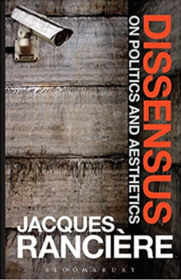
Dissensus
Jacques Rancière
anglicky
Dissensus: On Politics and Aesthetics brings together some of Jacques Rancière's most recent writings on art and politics to show the critical potential of two of his most important concepts: the aesthetics of politics and the politics of aesthetics. In this fascinating collection, Rancière engages in a radical critique of some of his major contemporaries on questions of art and politics: Gilles Deleuze, Antonio Negri, Giorgio Agamben, Alain Badiou and Jacques Derrida. The essays show how Rancière's ideas can be used to analyse contemporary trends in both art and politics, including the events surrounding 9/11, war in the contemporary consensual age, and the ethical turn of aesthetics and politics. Rancière elaborates new directions for the concepts of politics and communism, as well as the notion of what a 'politics of art' might be. This important collection includes several essays that have never previously been published in English, as well as a brand new afterword. Together these essays serve as a superb introduction to the work of one of the world's most influential contemporary thinkers. [amazon.com]
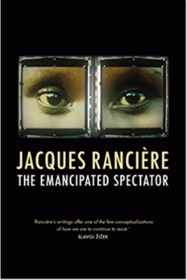
The emancipated spectator
Jacques Rancière
anglicky / 134 stran
The theorists of art and film commonly depict the modern audience as aesthetically and politically passive. In response, both artists and thinkers have sought to transform the spectator into an active agent and the spectacle into a communal performance. In this follow-up to the acclaimed The Future of the Image, Rancière takes a radically different approach to this attempted emancipation. First asking exactly what we mean by political art or the politics of art, he goes on to look at what the tradition of critical art, and the desire to insert art into life, has achieved. Has the militant critique of the consumption of images and commodities become, ironically, a sad affirmation of its omnipotence? [amazon.com]
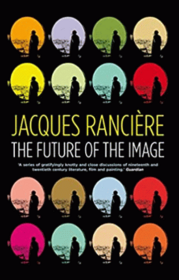
The future of the image
Jacques Rancière
anglicky / 2009
In The Future of the Image, Jacques Rancière develops a fascinating new concept of the image in contemporary art, showing how art and politics have always been intrinsically intertwined. Covering a range of art movements, filmmakers such as Godard and Bresson, and thinkers such as Foucault, Deleuze, Adorno, Barthes, Lyotard and Greenberg, Rancière shows that contemporary theorists of the image are suffering from religious tendencies. He argues that there is a stark political choice in art: it can either reinforce a radical democracy, or create a new reactionary mysticism. For Rancière there is never a pure art: the aesthetic revolution must always embrace egalitarian ideals. [amazon.com]
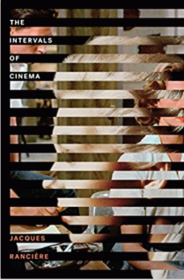
The intervals of cinema
Jacques Rancière
anglicky / 154 stran
Cinema, like language, can be said to exist as a system of differences. In his latest book, acclaimed philosopher Jacques Rancière looks at cinematic art in comparison to its corollary forms in literature and theatre. From literature, he argues, cinema takes its narrative conventions, while at the same time effacing literature’s images and philosophy; and film rejects theatre, while also fulfilling theatre’s dream. Built on these contradictions, the cinema is the real, material space in which one is moved by the spectacle of shadows. Thus, for Rancière, film is the perpetually disappointed dream of a language of images. [amazon.com]











